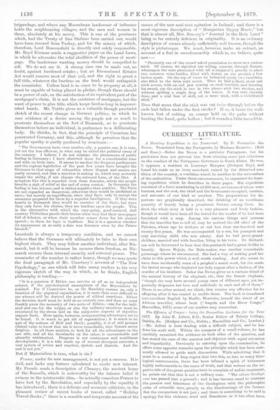CURRENT LITERATURE.
A Molting Expedition to the Transvaal. By D. Fernandes das Neves. Translated from the Portuguese, by Mariana Mcnteiro. (Bell and Sons.)—Senor das Neves is a patriotic Portuguese, but his patriotism does not prevent him from uttering some just criticisms on the conduct of the Portuguese Governors in South Africa. He was, it appears, a resident at Lourenco Marques (Delagoa Bay), and found his trade as an ivory merchant ruined by the disturbed con- dition of the country, a condition which he ascribes to the misconduct of the authorities. Under these circumstances, he organised the hunt- ing expedition which he describes in these pages. His expedition consisted of a force numbering in all 253 men, seventeen of whom were hunters, and the rest, the chief and his lieutenants excepted, carriers, and servants of one kind or another. The preparations for de- parture are graphically described, the drinking of an inordinate quantity of brandy being a prominent feature among them. In- deed, the whole story is told in a very pleasant and lively fashion, though it would have been all the better for the reader if he had been furnished with a map. Among the curious things and persona that the traveller has to tell of, may be noticed the old chief of the Palaines, whose age he reckons at not less than one huudred and twenty-five years. He was accompanied by a son, his youngest and only surviving child, who was ninety. And he had great-grand- children, married and with families, living in his town. Dr. Richard- son will be interested to hear that this patriarch had a groat dislike to brandy. Queen Mojaja, the Rain-maker, was another remarkable personage whom he encountered. She had a way of making good her claim to this power which is well worth reading. And she seems to have done incidentally some of a prophet's moral work, for she made the brutal savage who implored her help repent after a fashion, of the murder of his brothers. Sefior des Neves gives us a curious detail of the natural history of the elephant, viz., that the female elephant, "though she may have several young ones of different ages, yet im- partially dispenses her love and solicitude to each and all of them." There is no other animal, we think, that retains any affection for its offspring after it has ceased to suckle them. The book is translated into excellent English by Madlle. Monteiro, herself the sister of an African traveller, whose book (" Angola and the River Congo," Macmillan, 1875) some of our readers may remember.






























 Previous page
Previous page